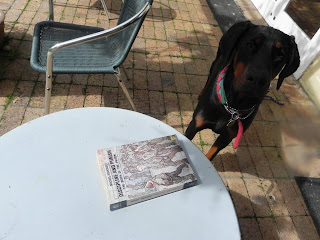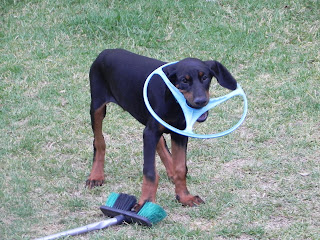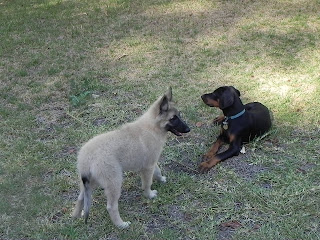I used that heading really only to smuggle a book title into this blog, since I don't think there'll be many other books mentioned this time round. But since I mentioned it, here it is, being perused, or at any rate sniffed, by Simon.
I can't claim to have done much more than sniff at Foucault in a long career of literary study, much of it coinciding with a veritable explosion of interest in Foucault. One of the minor joys of retirement is that I no longer feel I have to have read Foucault (as for
wanting to read Foucault, I don't think even Foucault can imagine that), along with Lacan, Derrida, and all the French genuises. (Who was it who said that when the emperor needs new clothes he shops in Paris?)
So this blog is not about Foucault. It
is about discipline, though not about punish.
As a responsible dog owner, I know that a trained dog is a happy dog, and, slightly more convincingly, that a trained dog alienates fewer people than an untrained dog (there are of course people who are alienated by dogs, whether trained or not, but they deserve neither our concern nor our even our time). I decided to invest in a trainer, not because I think a trainer knows magic tricks I can't pick up from books, but as a discipline (that word again) for myself. I know I am unlikely to keep up a training routine unless I have a structure in place to do so, and twice a week seemed like a manageable structure.
Somebody recommended Ivan (not his real name), so I phoned Ivan. He explained that he came to your house, and didn't use 'bribes', only plenty of praise. This seemed good, and I enrolled Simon for the obligatory 3-month course (at R900 a month, not a snip). Ivan sounded mildly surprised when I said I wanted to be part of the training; I suspect that since his Unique Selling Point is that he does home visits, he attracts clients who are only too happy to have their dogs trained for them while they do something more constructive like watching telly. I can't quite see the point of having a dog that's been trained to obey a stranger, but there's a lot of dog training I don't see the point of.
Ivan duly arrived in his Toyota bakkie. Ensconced (the OED tells me a sconce is a 'small fortification', which is accurate enough, except I'm talking BIG fortification) in the passenger seat was Ivan's daughter Ivana (not her real name), who filled so much of the cab that I wondered how Ivan could get to to the controls. She remained in position for the whole of the first lesson, chewing gum and fiddling with her mobile. In the back of the bakkie was Xolani (not his real name), who emerged only when called upon to do so, about which more later. In later classes, Ivana emerged from time to time to take Ivan's place; Simon seemed if not fascinated then at least interested; in all his months of socialisation he had never come across a human being occupying quite so much open space.
Ivan elected to have the training sessions on the plot of open ground in front of my house. This was probably a good idea, since that is more like Real Life than my lawn, and Real Life is what Simon has to learn to deal with. Real Life and Discipline.
Since I have now dug up my old copy of
Discipline and Punish, I checked what Foucault has to say on the subject of discipline. Of course, he has in mind soldiers and prisoners rather than dogs (imagine Foucault as a dog trainer: the Barbara Woodhouse of Social Science), but discipline is discipline, and, according to Michel, 'In the first instance, discipline proceeds from the distribution of individuals in space.'
So Ivan and I set about distributing Simon in space. Mainly we tried to distribute him in a sitting position, and get him to remain in that position when told to do so. But from the start Ivan and Simon did not click, as we say. (Clicker training is a whole different ball game, as it were, heavily dependent on 'bribes', or treats as they are called by proponents of the method.) When told to sit, Simon would consider his options, scan the surrounding territory, and if nothing presented itself to his indifferent gaze, would sit down in a kind of limp slump, for which I would be told to praise him lavishly. He seemed not particularly gratified at my praise. When told to 'stay' (I am here telescoping various classes into one), he would stay only if there was absolutely nothing else to do; more often, he would start digging a hole or peeing against a tree. As for the 'recall': this involves first getting your dog to stay, then calling him to you excitedly while gesturing frantically (Foucault talks of
the correlation of the body and the gesture, in this instance Simon's body with my gesture.) The theory is that the dog, having been straining at the invisible leash of your 'stay' command, will now joyfully run towards you, ready to perform your every wish. In practice, Simon either lay down and went to sleep, or turned around and trotted off to look for a pine cone.
In short, Simon was as bored with the classes as I was, only not as good as I at hiding his boredom. I could see that Ivan was getting rather short of patience with both of us, and he started almost wistfully telling me about his days of training Dobermanns for the police, the unspoken subtext being that there were alternative methods of training which might not come amiss in stubborn cases. As Foucault says: 'In discipline, punishment is only one element of a double system: gratification-punishment. And it is this system that operates in the process of training and correction.' And though Ivan wasn't exactly saying it, I could see that he felt we'd had enough of gratification; had he but known it, he was right in there with Foucault. When Simon wouldn't 'down' when told to do so, Ivan instructed me to step on his lead and force him down, which produced an undignified wrestling match, with Simon eventually rolling over on his back and biting the lead.
One of Ivan's party tricks was Food Refusal. For this we needed Xolani; indeed Food Refusal was Xolani's raison d'etre. He'd clamber out from the back of the bakkie armed with a little packet of meat. Ivan would arm himself with a two-litre Coke bottle filled with pebbles. The trick was for Xolani to offer Simon some meat; if Simon made to accept it, Ivan would throw the Coke bottle at him with an almighty clatter of pebbles. This scared the hell out of Simon, but he managed to swallow the meat anyway, until he became so terrified of the Coke bottle that he ran away as soon as Xolani appeared. This, of course, is known as Aversion Therapy, and I'm afraid that what it taught Simon an aversion to was not the meat. Ivan, though, seemed to find the outcome satisfactory. Xolani remained completely impassive, as he was through every meeting; I preferred not to wonder what he was thinking.
The crunch came one day with the Choke Collar. Now, I'd told Ivan from the start that I wouldn't use a choke collar. Years ago, in the dark days of dog training. I'd taken my first dog, Henry, rest his saintly soul, to what then passed for obedience training: now known as the Yank and Stomp Method, usually executed by formidable British women in sensible shoes and no-nonsense manners, Barbara Woodhouse clones one and all. The basic move in Yank and Stomp is .. well, yank and stomp. You yell 'HEEL!" and yank the choke chain so hard that the dog leaps to attention or is jerekd into an upright position, you then stomp off, and if the dog is sufficiently intimidated he'll follow, fearing another yank. I stopped going to these classes when Henry, who was the soul of gentleness, growled at me, as he had every right to do.
Anyway. So I said to Ivan that I had trouble getting Simon to walk on lead. Aha, he said, and called Xolani forth from the back of the bakkie with a collar. This I immediately assumed to be a choke chain, and I said I didn't want to use it. Ivan explained that it wasn't actually a choke chain. I said then why use it, since Simon is wearing a perfectly good collar, and I want to know how to walk him with
that. I can see that I must have struck Ivan as obstinate, and he had probably had enough of both me and Simon by then. 'Well, then,' he said,
'train your own bloody dog.' And he left, with Ivana impassively chewing gum in the passenger seat and Xolani glumly peering out of the back of the bakkie, and Simon and I ran home as if released from prison.
And now? I'm taking Simon to a group class on a beautiful farm near here, run by a wonderful trainer called Amanda (her real name), who thinks Simon is wonderful. Here he is bribed into more or less doing my bidding; the point, though, is that the atmosphere is such that it doesn't seem to matter over-much one way or the other, in spite of which Simon does seem to be learning something. This is his 'Sit-stay':
And that collar? I have a suspicion it's indistinguishable from the one that Ivan produced. But if that was what it took to liberate me and Simon from that depressing bakkie-load, I don't care too much. Must be one of the few times that a collar actually served as an instrument of liberation. I wonder what Foucault would have made of that.



















































